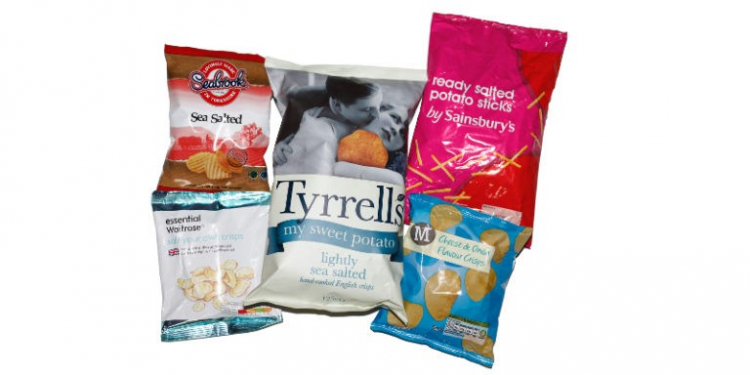Nearly one in five, aprox.17%, potato crisp varieties sampled from major retail food outlets in the UK have high levels of acrylamide, a known carcinogen, reveals independent testing, conducted by the Changing Markets Foundation, which reviewed 92 potato snacks from major UK snack brands and own-brand super market crisps.
A sample of sweet potato crisps from Tyrrells had the highest level of acrylamide at 2483.6 µg/kg; these levels are 2.5-times above the European benchmark and over 83-times higher than products with the lowest concentration.
The presence of acrylamide in food is considered a public health concern by the European Food Safety Authority (EFSA) as it increases the risk of developing cancer, and young children are the most vulnerable.
In total, sixteen samples exceeded the recommended EU benchmark (1000 µg/kg), with supermarket own brand products (12 samples) performing significantly worse than major snack brands (4 samples). The worst performing supermarket brands were Morrisons and ALDI, with three products above the benchmark each.
Thirty-one samples were above the lower EU benchmark (750 µg/kg) that will likely become part of new regulation.
Today’s findings come just a few months after the FSA published the results from its own monitoring showing 13 products exceeding the recommended acrylamide benchmarks. Products sampled from Seabrook, ALDI and ASDA brands have been found to exceed such benchmarks in both studies.
Nusa Urbancic from Changing Markets, said:“The results published today reveal that several companies found to exceed dangerous acrylamide levels by the FSA haven’t done anything to address this problem. Seabrook, ALDI and ASDA continue to place on the market crisps with high levels of this carcinogen. This clearly points to the failure of self-regulation by industry and weak enforcement by the FSA.”
Nevertheless, many food operators are still unaware of acrylamide or unwilling to take measures to reduce the levels due to a lack of mandatory legal limits. In response to this, a legislative proposal on acrylamide in food is currently being discussed by the European Commission and MemberStates and a vote is expected in June.






